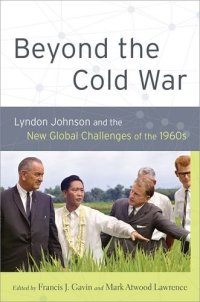
Ebook: Beyond the Cold War: Lyndon Johnson and the New Global Challenges of the 1960s
- Tags: World Civilization Culture Expeditions Discoveries Jewish Religious Slavery Emancipation Women in History Diplomacy International Politics Government Social Sciences Africa Ancient Asia Europe Latin America Middle East Military United States Humanities New Used Rental Textbooks Specialty Boutique Relations Political Science
- Series: Reinterpreting History: How Historical Assessments Change over Time
- Year: 2014
- Publisher: Oxford University Press
- Edition: 1
- Language: English
- pdf
In writing about international affairs in the 1960s, historians have naturally focused on the Cold War. The decade featured perilous confrontations between the United States and the Soviet Union over Berlin and Cuba, the massive buildup of nuclear stockpiles, the escalation of war in Vietnam, and bitter East-West rivalry throughout the developing world. As the world historical force of globalization has quickened and deepened, however, historians have begun to see that many of the global challenges that we face today
Beyond the Cold War examines how the administration of President Lyndon B. Johnson responded to this changing international landscape. To what extent did U.S. leaders understand these changes? How did they prioritize these issues alongside the geostrategic concerns that dominated their daily agendas and the headlines of the day? How successfully did Americans grapple with these long-range problems, with what implications for the future? What lessons lie in the efforts of Johnson and his aides to cope with a new and inchoate agenda of problems? By reconsidering the 1960s, this work suggests a new research agenda predicated on the idea that the Cold War was not the only - or perhaps even the most important - feature of international life in the postwar period.
Beyond the Cold War examines how the administration of President Lyndon B. Johnson responded to this changing international landscape. To what extent did U.S. leaders understand these changes? How did they prioritize these issues alongside the geostrategic concerns that dominated their daily agendas and the headlines of the day? How successfully did Americans grapple with these long-range problems, with what implications for the future? What lessons lie in the efforts of Johnson and his aides to cope with a new and inchoate agenda of problems? By reconsidering the 1960s, this work suggests a new research agenda predicated on the idea that the Cold War was not the only - or perhaps even the most important - feature of international life in the postwar period.
Download the book Beyond the Cold War: Lyndon Johnson and the New Global Challenges of the 1960s for free or read online
Continue reading on any device:

Last viewed books
Related books
{related-news}
Comments (0)